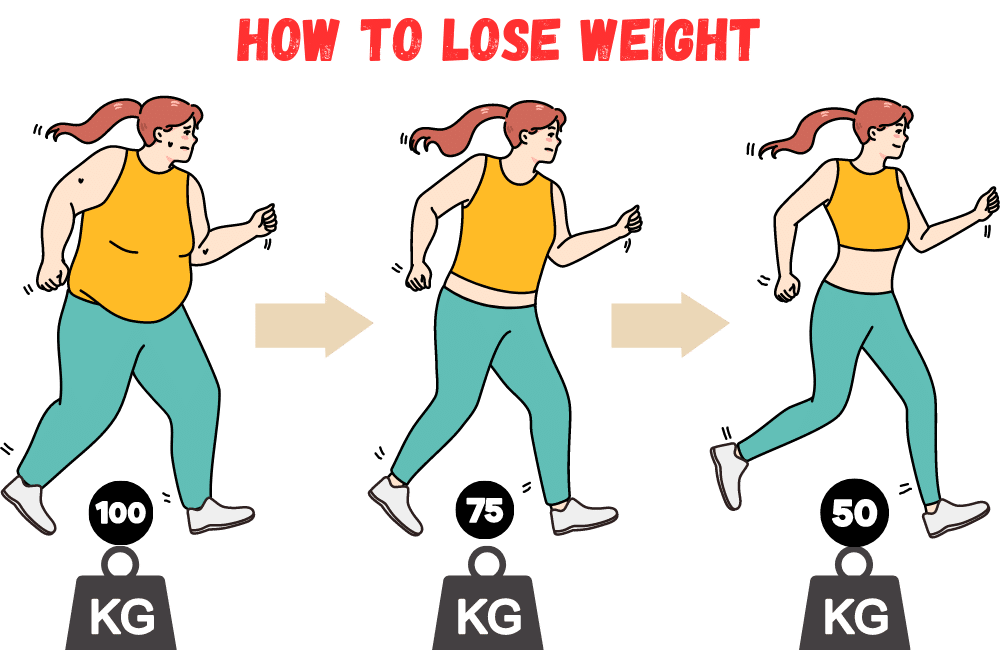Are You Tired of Struggling to Lose Weight? Discover the Proven Strategies for Success! If you’re looking to lose weight, you’re not alone. Millions of people around the world struggle with weight loss every day. However, losing weight can be difficult without the right guidance and support. In this article, we’ll explore some of the best strategies for losing weight and keeping it off for good.

How to Lose Weight
Weight loss is a complex process that requires a multifaceted approach. It involves making dietary changes, engaging in physical activity, and addressing any underlying health issues contributing to weight gain. Howeveranyone can achieve their weight loss goals with the right mindset and strategies with the right mindset and strategies with the right mindset and strategies.
Let’s begin the journey towards achieving your desired body shape! However, keep in mind that losing weight is not an easy task and requires patience. So, if you’re ready for the challenge, read on and discover some effective tips to help you shed those extra pounds.
The Benefits of Losing Weight
Before you embark on any weight loss journey, it’s important to understand the benefits that you can gain from taking these steps. Shedding those extra pounds can provide numerous advantages for both your physical and mental well-being. Some of the key benefits of losing weight include:
- Lower risk of chronic diseases: Being overweight or obese can increase your risk of developing a range of chronic diseases, including diabetes, heart disease, and certain types of cancer. Losing weight can help to reduce your risk of these conditions.
- Improved mobility: Carrying excess weight can make it difficult to move around comfortably. Losing weight can improve your mobility and make it easier to perform daily activities.
- Increased energy: Losing weight can also increase your energy levels, making staying active throughout the day easier.
- Better sleep: Carrying excess weight can also lead to sleep disturbances. Losing weight can help to improve the quality of your sleep.
- Improved mood: Losing weight can also positively implacental health, improving your mood and reducing symptoms of depression and anxiety.
The Science of Weight Loss
At its core, weight loss is about creating a calorie deficit. This means consuming fewer calories than your body needs to maintain its current weight. When you create a calorie deficit, your body begins to use stored fat as a source of energy, resulting in weight loss.
However, the science of weight loss is more complex than simply consuming fewer calories. There are a number of factors that can impact weight loss, including genetics, hormones, and lifestyle habits.
Common Myths About Weight Loss
There are a lot of myths and misconceptions surrounding weight loss. Some of the most common include:
Myth: Fad diets are the best way to lose weight quickly.
Reality: Fad diets may help you lose weight in the short-term, but they are not sustainable or healthy in the long-term. They often involve extreme restrictions and can lead to nutrient deficiencies and other health problems.
Myth: You have to give up your favorite foods to lose weight.
Reality: You can still enjoy your favorite foods in moderation while losing weight. It’s all about finding a balance and making healthy choices overall.
Myth: Cardio is the best type of exercise for weight loss.
Reality: While cardio can be beneficial for weight loss, strength training is also important. Building muscle can help to increase your metabolism and burn more calories throughout the day.
Strategies for Healthy Weight Loss
If you’re looking to lose weight in a healthy and sustainable way, there are a few key strategies to keep in mind
Eat a balanced diet
Focus on consuming a variety of nutrient-dense foods, including fruits, vegetables, lean protein, and healthy fats. Avoid processed and high-sugar foods as much as possible.
Get plenty of exercises
Aim for at least 150 minutes of moderate-intensity physical activity per week. This can include activities like brisk walking, cycling, or swimming.
Do you want to know what are the 10 best exercises to improve your health then click here.
Stay hydrated
Drink plenty of water throughout the day to help your body function properly and avoid overeating.
Get enough sleep: Aim for 7-8 hours of sleep each night to support healthy weight loss.
Practice mindful eating
Pay attention to your hunger and fullness cues and eat slowly to avoid overeating.
Consider working with a healthcare professional
A healthcare professional can help you create a personalized weight loss plan that takes into account your individual needs and health concerns.
Tips for Maintaining Weight Loss
Once you’ve achieved your weight loss goals, the key is to maintain your weight loss over the long term. Some tips for maintaining weight loss include:
- Stay active: Continue to engage in regular physical activity to maintain your weight loss and overall health.
- Practice mindful eating: Continue to pay attention to your hunger and fullness cues and make healthy food choices.
- Monitor your weight: Weigh yourself regularly to help you stay on track and make adjustments as needed.
- Find support: Surround yourself with a supportive network of friends and family members who can help you stay motivated and on track.
- Stay positive: Celebrate your successes and focus on the positive changes you’ve made rather than any setbacks.
Happy Success!
Losing weight can be challenging, but with the right strategies and support, it is possible to achieve your goals. By focusing on a balanced diet, regular physical activity, and healthy lifestyle habits, you can lose weight in a sustainable way and enjoy the many benefits that come with a healthy weight. Remember to stay positive, stay motivated, and stay committed to your goals for the best chance of success.

